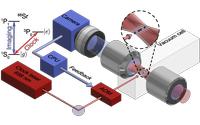Abstract
 Quantum materials with exotic properties
are poised to revolutionize approaches to store, process, and distribute
information and energy. Quantum simulators accelerate the discovery of such
materials by providing a platform to explore the static and dynamic properties
of quantum many-body systems that would be otherwise inaccessible using
classical simulators. In this talk, I will first describe our ongoing effort to
democratize access to quantum simulators based on reconfigurable arrays of
neutral atoms excited to Rydberg states. Such Rydberg atom arrays have recently
emerged as a versatile platform to explore interacting spin systems on lattices
with reconfigurable geometry and dimensionality. I will then review our recent work
from Caltech demonstrating the cooling, trapping, and imaging of single
alkaline-earth atoms in optical tweezer arrays [1-2], the high-fidelity
preparation and readout of alkaline-earth Rydberg atoms [3], and the operation
of atomic clocks with single-atom resolution [4].
Quantum materials with exotic properties
are poised to revolutionize approaches to store, process, and distribute
information and energy. Quantum simulators accelerate the discovery of such
materials by providing a platform to explore the static and dynamic properties
of quantum many-body systems that would be otherwise inaccessible using
classical simulators. In this talk, I will first describe our ongoing effort to
democratize access to quantum simulators based on reconfigurable arrays of
neutral atoms excited to Rydberg states. Such Rydberg atom arrays have recently
emerged as a versatile platform to explore interacting spin systems on lattices
with reconfigurable geometry and dimensionality. I will then review our recent work
from Caltech demonstrating the cooling, trapping, and imaging of single
alkaline-earth atoms in optical tweezer arrays [1-2], the high-fidelity
preparation and readout of alkaline-earth Rydberg atoms [3], and the operation
of atomic clocks with single-atom resolution [4].
[1] A. Cooper, J. P. Covey, I. S. Majarov,
and M. Endres, Phys. Rev. X 8, 041055 (2018);
[2] J.P. Covey, I. S. Majarov, A. Cooper,
and M. Endres, Phys. Rev. Lett. 122, 173201 (2019);
[3] I. S. Madjarov, J.P. Covey et al.,
arXiv:2001.04455 (2020);
[4] I. S.
Majarov, A. Cooper et al., Phys. Rev. X 9, 041052 (2019).
Alexandre Cooper-Roy is a returning Canadian leading the effort of delivering quantum simulators to early adopters as Senior Technical Lead in Transformative Quantum Technologies at the University of Waterloo. As a postdoctoral scholar in the group of Prof. Manuel Endres at Caltech, Alexandre achieved the first realization of trapping, cooling, and imaging of alkaline-earth atoms in optical tweezers, as well as the first demonstration of coherent excitation to Rydberg states, leading to ground-breaking experiments in the operation of atomic clocks with single-atom resolution. As a graduate student in the group of Prof. Paola Cappellaro at MIT, Alexandre demonstrated environment-assisted quantum-enhanced sensing with entangled states of heteronuclear spins in diamond and introduced a novel sampling protocol for measuring time-varying magnetic fields at the atomic scale using nanoscale quantum sensors. Alexandre completed his education on three continents, earning a MEng from the University of Tokyo in Japan, a Diplôme de l’École Polytechnique (X05) in France, and a BEng from École Polytechnique of Montréal in Canada.

